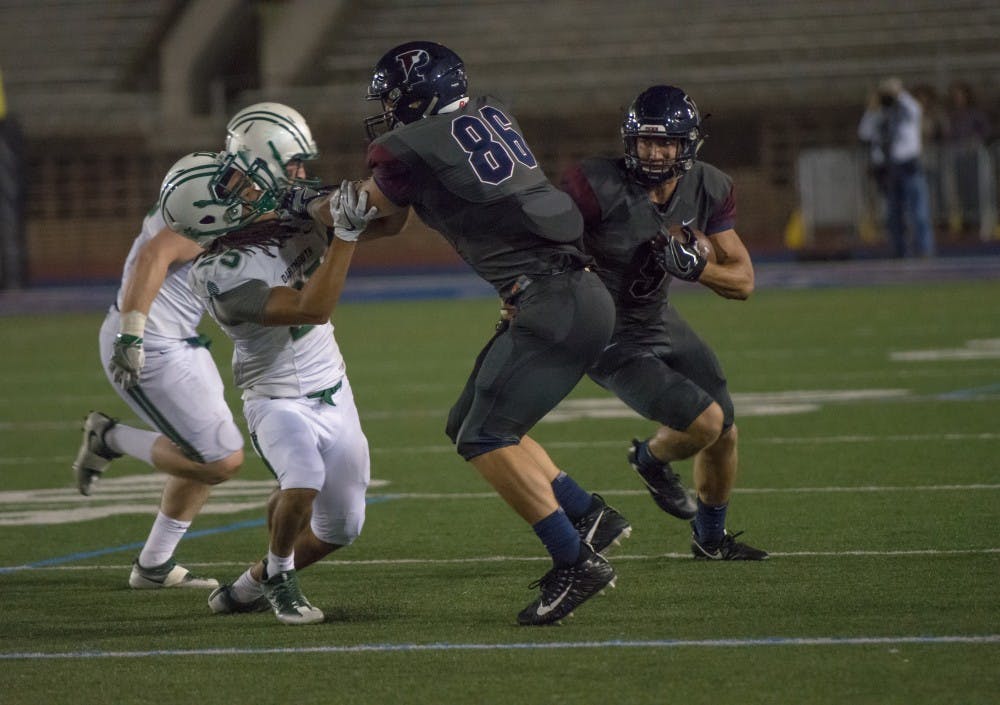
Penn football and senior Justin Watson failed to get it done offensively against Dartmouth in Ivy League opener.
Credit: Zach SheldonHeartbreak (noun) — losing in the last seconds of the game on 4th-and-inches.
What happened to Penn football Friday night was exactly that: heartbreak.
Beyond the raw emotional reaction of losing on a walk-off touchdown on national television, Penn’s performance left something to be desired. Coach Ray Priore rightly credited Dartmouth for a well-played game, but the loss highlighted weaknesses in the Quakers' squad that had not been made evident in the non-conference slate.
In football, everything starts with the quarterback. In his first Ivy League start, senior Will Fischer-Colbrie was… ok. He looked shaky to start as the Penn offense struggled to get things going in the first quarter, and he never really settled in from there. To a certain extent he shouldn’t have had to; Penn should be able to put more than 13 points on the board considering the wealth of talent around Fischer-Colbrie. The quarterback didn’t win the game for Penn, but he did enough to give them a chance, and that’s really all you can ask for from first-year starter.
The real problem on offense was the lack of contributions from the skill players, especially NFL hopeful Justin Watson and breakout sensation Karekin Brooks. After amassing over 300 yards rushing in both of their first two games, the Quakers ended Friday night with only 85, and Watson ended with just 81 all-purpose yards.
If I had to predict the outcome of a game in which both Watson and the running game were held under 100 yards, I would have predicted a blowout, not a heartbreak. The offensive numbers raise an important question: was Penn’s superlative offensive production in the first two games a function of their firepower or of Ohio Dominican and Lehigh’s soft defenses?
A bright spot for the Quakers last night came on the opposite side of the ball. If the defense continues to hold teams to 16 points, you would have to like the Quakers' chances. The Quaker defense all but eliminated Dartmouth’s big plays and forced the Big Green to fight for every yard.
The bend-but-don’t-break mentality worked beautifully. The criticism is that while Penn stopped Dartmouth’s big plays, they never came up with one of their own. For a defense that prides itself on its ball-hawking mentality, the lack of turnovers ultimately did them in. And when they desperately needed a stop on the game’s final drive, the Quakers couldn’t get off the field, even on two massive, potentially game-winning fourth downs.
Ultimately however, Penn played well enough to win. Even acknowledging all the mistakes and shortcomings listed above, they had a chance to win the game on the very last play. They were literally a half-yard short from a win. If they had completed what would have been a goal-line stand for the ages, the takeaway would be that great teams win even on bad days. One play was the difference between escaping with a hard-fought win, and faltering in a heartbreaking loss. Such is the parity in the Ivy League.
The conference parity that hurt the Quakers on Friday night is the same that gives the rest of their season meaning. Recent years have proven that one loss isn’t enough to eliminate a team from Ivy title contention, with both of Penn's last two Ivy titles coming with a 6-1 Ancient Eight record.
The road to a third straight title just got a lot steeper, but the Quakers are more than capable of ironing out the mistakes and coming out of the experience a better team. For Penn, this loss needs to be the motivation to storm back and fulfill the potential it has shown both in previous seasons and in the non-conference slate.
In short — don’t pronounce the Quakers dead just yet. Like last-year’s men’s basketball team, they still have plenty of fight in them.
The Daily Pennsylvanian is an independent, student-run newspaper. Please consider making a donation to support the coverage that shapes the University. Your generosity ensures a future of strong journalism at Penn.
Donate



